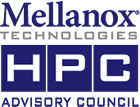Where to turn in a time of need. In need of MFLOPS, that is.
 "The only constant is change" said Heraclitus, an ancient Greek philosopher. This is certainly true when describing the market of high-performance computing (HPC). The HPC market is characterized by a rapid change of architectures, technologies and usage. The only continuously steady characteristic of HPC is the ever-growing demand for performance, showing an increase of 100X every ten years based on the TOP500 list. The HPC market drives the computing technology further and evaluates many leading edge architectures. Proven solutions that have been widely adopted in the HPC are accepted in commercial high-performance computing markets such as automotive, oil and gas, financial, digital media, bio-science and mathematical modeling.
"The only constant is change" said Heraclitus, an ancient Greek philosopher. This is certainly true when describing the market of high-performance computing (HPC). The HPC market is characterized by a rapid change of architectures, technologies and usage. The only continuously steady characteristic of HPC is the ever-growing demand for performance, showing an increase of 100X every ten years based on the TOP500 list. The HPC market drives the computing technology further and evaluates many leading edge architectures. Proven solutions that have been widely adopted in the HPC are accepted in commercial high-performance computing markets such as automotive, oil and gas, financial, digital media, bio-science and mathematical modeling.
Clustered commodity servers have become the dominant solution for HPC systems as they offer tremendous price/performance benefits, unparalleled flexibility in deployment, and reduced long-term maintenance. With the fast adoption of the cluster architecture, the importance of integrating all of its parts is paramount, from hardware â CPU, memory, interconnect and attached storage â to software, including drivers, libraries (such as MPI), operating systems and parallel applications.
While high-performance computing continues to be one of the fastest-growing segments in the IT industry, the general commercial sector is still underutilizing the available HPC technologies. In many cases, users do not maximize the potential of high-performance computing to get better, safer, and more reliable products to market more quickly. Moreover, in some cases, users have not made the jump from single workstations into HPC clustering due to lack of knowledge, even though they are facing problems that can not be solved on their current systems.
Our Mission
The HPC Advisory Councilâs mission is to bridge the gap between HPC use and its potential, to bring system integrators and users the human expertise needed to operate an HPC setup, to provide application designers with the tools needed to enable parallel computing, and to strengthen the qualification and integration of various clustering components.The HPC Advisory Council is a computing ecosystem that includes best-in-class original equipment manufacturers (OEMs), strategic technology suppliers, independent software vendors (ISVs) and selected end-users across the entire range of HPC market segments. As of September 2008, the Council includes more than 50 members, including: AMD, Appro, Blue Ridge Numerics, Clustercorp, Colfax International, Corning Cable Systems, DataDirect Networks, Dell, Evergrid, Fermi National Accelerator Laboratory, GigaSpaces Technologies, HCL Infosystems, HP, IBRIX, IBSwitches.com, Intel, The Israeli Association of Grid Technologies (IGT), Lamprey Networks, Livermore Software Technology Corporation, LSI Corporation, Mellanox Technologies, Microsoft, Microway, NEC Corporation of America, Netweb Technologies, Network Equipment Technologies, Oak Ridge National Laboratory, Ohio State University, Panasas, ParTec Cluster Competence Center GmbH, RNA Networks, SGI, Scalable Graphics, ScaleMP, Schlumberger, Silicon Mechanics, SoftModule, Sun Microsystems, Swiss National Supercomputing Centre CSCS, System Fabrics Works, Terascala, The Victorian Partnership for Advanced Computing, Virginia Tech University, Voltaire, VXTECH, W.L. Gore & Associates, Wipro InfoTech, Wolfram Research and Z Research.
Cluster Center
The HPC Advisory Council operates a Cluster Center at the Mellanox offices in Santa Clara, California. The Cluster Center includes multiple HPC systems and storage donated by HPC Advisory Council members â AMD, Colfax International, Dell, Intel, Sun and Z Research to name a few. The Cluster Center operates around the clock to provide a place for each member to qualify and optimize software applications and to ensure interoperability of various hardware components. It also provides, free of charge, a testing and benchmarking center for end users. As a result, many end user RFPs are being based on testing results gathered using the Cluster Center.Along with the HPC Cluster Center, the HPC Advisory Council targets education and outreach as one of its main goals. Together, the Council educates users on how to migrate from workstations or desktops into high-performance clustering in order to achieve productivity and capabilities that deliver better and more innovative products while also bringing them to market more quickly. The Council will provide recipes for building efficient clustering solutions, will post technical information, and will drive real case studies to be performed by end-users with the Councilâs support.
Network of Expertise
In order to provide end users with information on HPC solutions and troubleshooting, the Council operates the Network of Expertise. Each of the Council members provides technical experts that are connected together via a virtual network to provide their extensive knowledge to end users, systems builders and application providers. The Network of Expertise can be reached by emailing to This email address is being protected from spambots. You need JavaScript enabled to view it.. For example, a customer may have a particular application to host, and may require information on the types of systems that would be most appropriate; or a current user may be experiencing a storage bottleneck and is looking for a solution; or an end user needs help troubleshooting an issue regarding his/her setup.Blog
The HPC Advisory Council operates a blog that hosts news from its members that are of an interest to the HPC community and end-users. The postings can be read at blog site.For More Information
More information on the Network of Expertise can be found here and the technical content posted by the members at here. For more info on the HPC Advisory Council, and information on how to join, please refer to our web site or send an email to HPC(you know what to put here)mellanox.com.